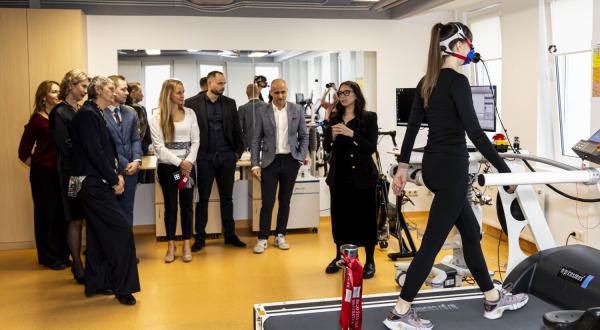Trimming excesses - the Lean methodology makes the university more efficient

Better student services, more efficient evaluation of guest lecturers and an improved study process planning system – this is only a small portion of the benefits that Riga Stradiņš University (RSU) will gain by applying the Lean Methodology. The methodology originated in Japan as an approach to manufacturing, but has since grown to be a common set of tools for improving organisations’ efficiency used all over the world. RSU introduced the method last year as part of Specific Objective 8.2.3 of the European Social Fund. Since then 20 teams from various structural units at RSU have already assessed their everyday processes with the objective of raising productivity.
To accomplish more, rather than to do less is the best way to summarise the Lean approach. The RSU Quality Assurance and Internal Audit Department has adopted the approach over the last seven months and is responsible for implementing the method according to the framework of the project. Other academic and administrative structural units, including the Student Union, have also been using the method. A total of 28 RSU employees have acquired Lean principles in a two-day training course with the purpose of raising the productivity of their structural units. Meanwhile 41 RSU employees from the Communication Department, the IT Department, the Finance Department, the Department of Internal Diseases, the Human Resources Department, the Study Department, Student Services, the Language Centre and several other structural units have implemented the principles by collaborating in several work groups.

‘In English, “lean” means thin, with no excesses and that is precisely the objective of the methodology – to optimise the time and other resources that we spend on certain activities daily,’ says Vija Feldmane, who, together with her colleagues from the Quality Assurance and Internal Audit Department, is responsible for implementing this project at RSU. Each work group was tasked with focusing on a particular issue and looking for improvements in that area, like how to issue a certificate to a student faster? How to enliven the guest lecturer assessment process, which is currently quite formal? How to raise the efficiency of monitoring student complaint appeals? How to improve space planning systems? ‘If introducing Lean methodology in an organisation is successful, this approach will become a corporate lifestyle and a part of the organisation’s culture. Each step of the working day will be assessed in terms of where time or money can be saved,’ Feldmane says.
The team from the Quality Assurance and Internal Audit Department explain that where initially colleagues had to be persuaded to propose processes that could benefit from the Lean method, the fruits of this project started to manifest later in spring which in turn prompted other structural units to participate. ‘Internal communication at RSU benefits from the introduction of Lean methods as well – meetings are organised so that departments and divisions that do not often come together can do so to share information,’ emphasises Sandra Vjaksa, the Head of the Quality Assurance and Internal Audit Department. It was at precisely such a work group, which gathered financiers as well as representatives from Student Services and other areas, where marketing representatives from the Communication Department had an opportunity to present and review the university’s new souvenir sales concept. ‘The marketing team had already developed a concept, but the Lean work group enabled all involved parties to meet and review the ideas, cutting off all excess in order to enable the implementation of this project as soon as possible,’ says Katrīna Bērziņa, Marketing Project Manager. Bērziņa hopes that the new shop, which will sell books published by RSU as well as souvenirs, will be opened in the lobby of the central building as early as spring 2020.
According to framework of the EU Structural Fund, the implementation of the Lean methodology is scheduled to be finalised by the end of this year.




